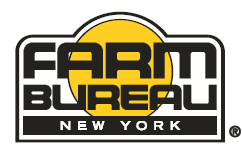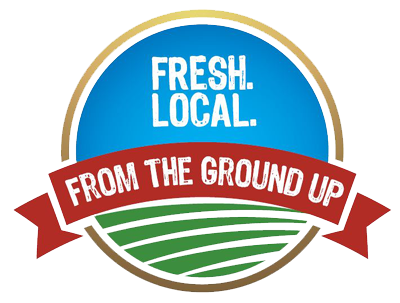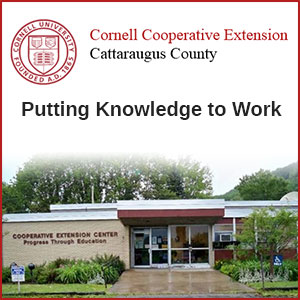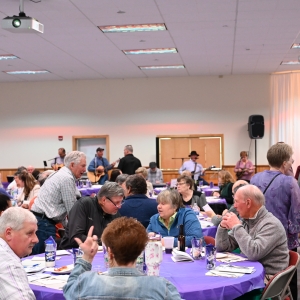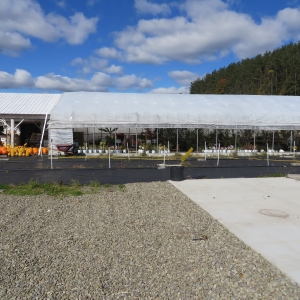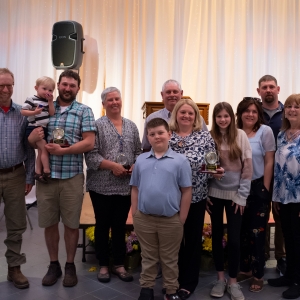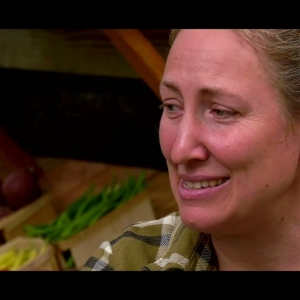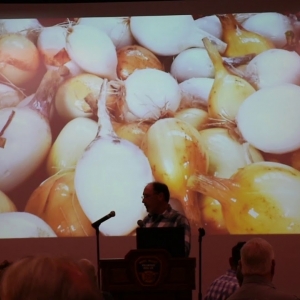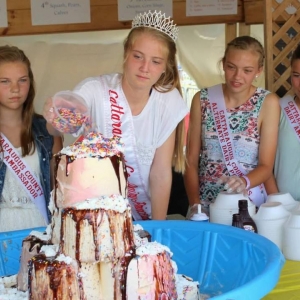Other Ag News: Creemees, Community, and Coalition: NSAC’s Summer Meeting in Stowe, Vermont
As we do every summer, NSAC coalition members recently gathered for our summer meeting, from August 4-7, in Stowe, Vermont. Located some 25 miles east of Vermont’s largest city, Burlington, and about 40 miles from the US-Canada border, we met at the Trapp Family Lodge (yes, that’s right – owned by the Von Trapp Family, from The Sound of Music!) in Stowe, nestled in the Vermont hills with Mount Mansfield looming in the distance over our meeting place. The location provided a soothing place to hunker down and put our heads together to strategize around our priorities and campaigns. The haze from Canadian fires did not deter some morning walks, nor did it deter our spirit to advance NSAC’s priorities.
A hazy view from the Trapp Family Lodge, Stowe, VTAs the air cleared towards the end of the week, we spent some time gathered around a fire, renewing our spirits as we socialized with one another, talked shop, and discussed where to find the best maple creemees. If you have never been to Vermont, you, too, as many of us did, may be wondering what the heck are creemees. Creemees are soft serve ice cream, pumped through a machine to make it more airy, and they are considered the unofficial taste of summer in Vermont. Try one, should you ever find yourself in the Green Mountain State!
A little bit of Austria, a lot of Vermont Vermont NSAC MembersEvery year, NSAC staff collaborate with member organizations to select the site of our summer meeting. This year, NOFA-Vermont made suggestions and recommendations that helped guide the selection. As advocates for a more sustainable food and agricultural system and NSAC member organization, NOFA Vermont understands the local landscape in the Green Mountain State, and they played an important role in planning our 2025 Summer Meeting.
During our opening session, we were treated to a warm welcome to Vermont from NOFA-Vermont Executive Director Grace Oedel, who shared a brief history of what agriculture has looked like in the state since before European colonization, when the Abenaki people still controlled the land, and contextualized their present work in the state. She explained how the landscape has changed over Vermont’s history, from the push to clear land for sheep enterprises beginning with colonization, with booms and later consolidation in apples, then dairy, and then the maple sector. At the same time, she also emphasized the boom in diversified farms in the state beginning in the 1960s and 1970s, and how Vermont is still made up of many small, diversified farms. When the state experienced historic flooding several years in a row, these farms – many of which do not have access to crop insurance – were left with significant losses. In addition to the lack of workable crop insurance options for these farms, FEMA disaster aid also does not reach most Vermont farmers. As a result of the increasing risks of these kinds of disasters and their impact on farmers, NOFA-VT has undertaken a grassroots campaign to establish a state-funded Farm Security Fund to create a safety net for Vermont farmers. Grace also spoke to other successful organizing efforts to improve the state’s food system, lifting up the work of the Vermont-based farmworker organization Migrant Justice in establishing the Milk with Dignity Standards Council to improve labor standards in the dairy industry in the state.
Farm ToursAt every summer meeting, we take the opportunity to visit some local farms to learn about local farming practices, economies, challenges, and labor. Visiting local farms during the summer meeting allows us to gain insight about how federal agricultural policies are working on the ground and if there are any adjustments that should be considered in our recommendations and advocacy.
Butternut MountainLocated in Morrisville, Butternut Mountain Farm is one of the largest maple processors and distributors in the United States. Although tapping maple sap to make syrup takes place during the winter months, a changing climate is presenting new challenges to maple syrup production. Summer months at a maple syrup-producing farm are spent managing the forest ecosystem in which maple trees thrive so that maple production can continue to take place during the winter months. This family-run operation produces syrup from the maple trees on its land, and also purchases from maple farmers throughout Vermont, Maine, New York, and Canada.
Maple Syrup Tasting at Butternut Mountain FarmVisitors were given a tour of the state-of-the-art facility, where they learned about the different grades of maple syrup and their various maple products (maple syrup, maple candy, and maple sugar). This visit included a delicious syrup and candy tasting, as well as a presentation on the family farm’s history and the history of maple syrup in America, which provided great grounding for the context offered by NOFA Vermont during our opening session. Visitors also learned of Butternut Mountain’s ongoing efforts to convert to renewable energy at each stage of their operation to sustain the future of Vermont maple syrup production for decades to come.
Foote BrookFoote Brook Farm is located in Johnson, Vermont, in the Lamoille River Valley, and is a member of NOFA Vermont’s network. The family-owned farm is organic certified, grows 145 varieties of organic produce, and has implemented a Community-Supported Agriculture (CSA) program since 2014. Foote Brooke Farm also sells perennial grass, otherwise known as sod, which improves chemical and physical soil properties and can be part of a healthy crop rotation system, sequestering more carbon and increasing organic matter in the soil.
Touring the grounds of Foote Brook FarmDuring the visit, third-generation farmers Tony and Joie Lehouillier greeted visitors, provided an overview of the history of their farm, and shared about the challenges they have faced in recent years, particularly the devastating floods that impacted their operations in July 2023 and 2024. The floods caused massive damage to crops, barns, machinery, and essential supplies, including fertilizer and feed. They lost an estimated 75 percent of their crops and faced nearly half a million dollars in damages. The environmental toll was severe as well; topsoil and nutrients were stripped away, and contaminated sediment was left behind in some growing areas. Despite the setbacks, the Lehouilliers refused to give up. Through a combination of emergency grants, community donations, and sheer determination, they have worked to rebuild their soil, replant fields, and reimagine parts of the farm for long-term resilience. Their story is one of perseverance, adaptation, and an unwavering commitment to local food and community.
The farm stand at Foote Brook Farm Maple Wind Maple Wind FarmWe had the opportunity to visit the small livestock farm and processing operation of Maple Wind Farm in Richmond. Maple Wind raises pastured chicken, turkey, pork, and grass-fed beef, though natural disasters that have flooded part of the valley have forced the farm to shift its operations more to chicken and away from beef. Maple Wind is one of a small number of farms that operate a USDA-inspected processing facility on-site, processing both their own poultry and other producers’ poultry as well, providing a critical food system resource for local producers and eaters alike. The visit to Maple Wind offered a chance to better understand the challenges small poultry processors face in finding workers, accessing federal grants that would allow them to improve the efficiency of their operations, and upgrading their equipment, issues that align closely with NSAC’s advocacy in support of the Strengthening Local Processing Act.
Jericho Settlers Jericho Settlers FarmOn the western slopes of the Green Mountain Range and about 10 miles east of Burlington, lies Jericho, where we visited Jericho Settlers Farm, an intergenerational family farm growing certified organic vegetables for wholesale and institutional markets, and also running a CSA program.
Jericho Settlers FarmOur host narrated some of the challenges they faced scaling their operations, sourcing schools and restaurants, and maintaining crop insurance when natural disasters, such as flooding from a nearby river, keep occurring. This was a topic that NSAC members and staff on that tour were more than eager to discuss, especially learning about the various creative ways that Jericho Settlers were able to finance the installation of many high tunnels, which have enabled them to expand their production season year-round.
So Long, FarewellBack in Stowe, after spending half a day visiting farms and engaging in some insightful conversations on the farms and earlier in the day during our strategy sessions, we were ready to let loose for a little while. NSAC hosted a Happy Hour with food and drinks at Stowe Cider. With a large lawn and picnic tables where we could connect, we compared notes and met new and old Coalition allies and friends based in Vermont who could stop by to build community with us.
A few of our favorite things at Stowe CiderAfter several days of learning, strategizing, and connecting, we closed our meeting as we usually do, mapping out next steps for the coming months until we reconvene in Washington, DC, for our winter meeting. We closed our meeting in Stowe feeling determined to continue fighting for the food and agricultural system we deserve: one that is kinder to our families and communities; that levels the playing field for farmers of small farms, farmers of color, workers, and communities with little access to quality food; that helps keep farmers on the land and resilient to the impacts of climate change; and that has the infrastructure for rural areas to market and access more locally produced food. To that end, we will continue working with Congress to make sure that ALL farmers have a fair chance at succeeding, and not just the ones with the deepest pockets and the most land.
Auf Wiedersehen, Vermont!The post Creemees, Community, and Coalition: NSAC’s Summer Meeting in Stowe, Vermont appeared first on National Sustainable Agriculture Coalition.
Signup for the Ag Newsletter
Get the freshest farm news, events and updates from in and around Cattaraugus County, NY at least once a month! Go signup!
Other ways to stay connected:
Get Involved in Farming
Resources for Starting a Farm in Cattaraugus County
Profile of Cattaraugus County soils
Agriculture Career Exploration
Questions about farming? Find out Who to Call

